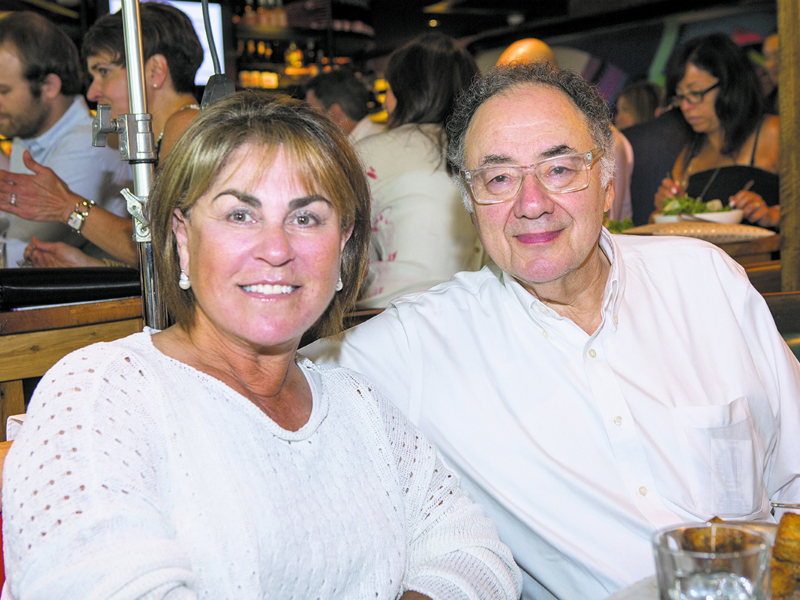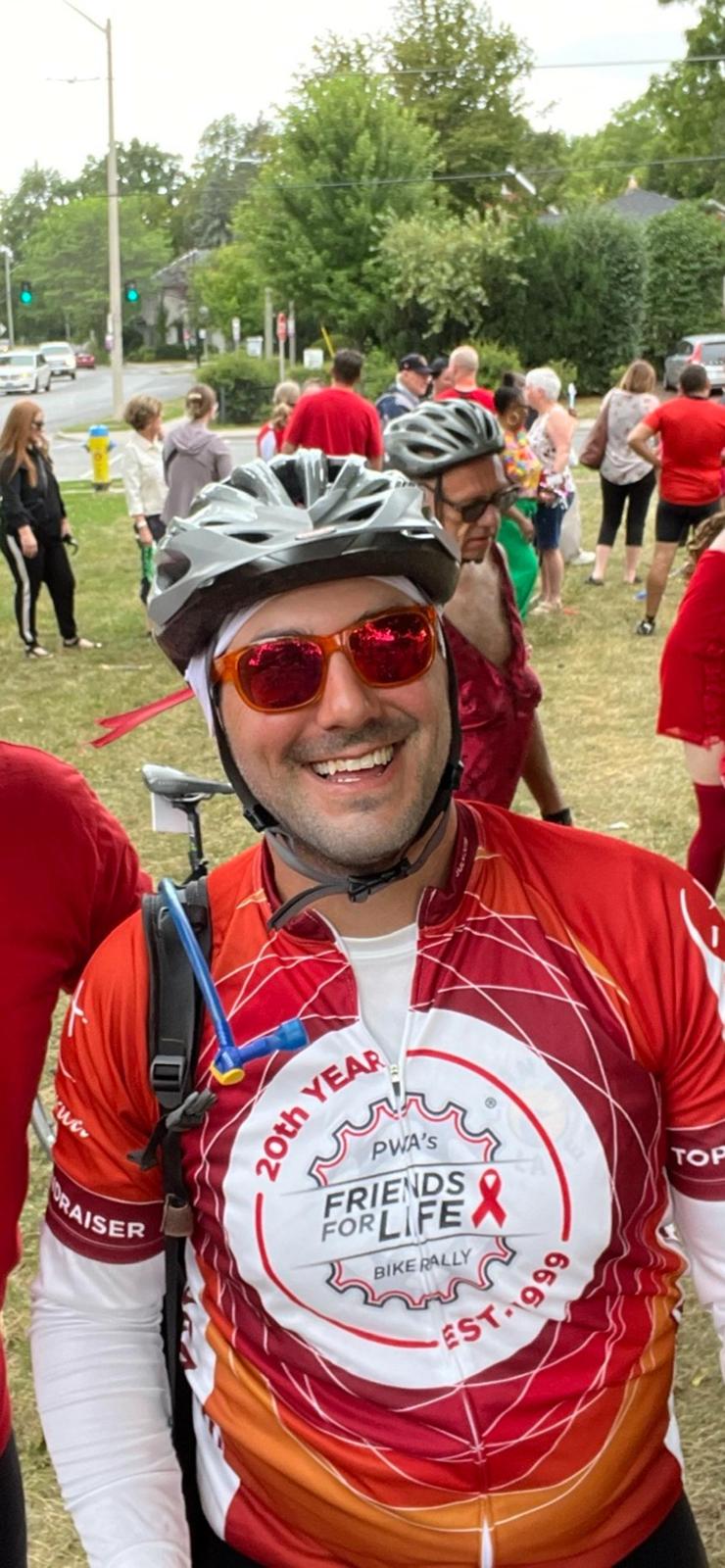Jonathon Sherman, the only son of the slain Canadian billionaire philanthropists Honey and Barry Sherman, is joining their legacy of community building in a very big way.
In making the announcement June 29, Sherman explained why he’s donating $52 million to the Toronto Jewish community so it can build the Honey and Barry Memorial Arena on the grounds of an existing Jewish community campus in Vaughan, Ont.
“The arena announcement, of course, brings heavy emotions,” Sherman told The CJN in a written statement. “At the same time, this week is really about celebrating my parents’ legacy of community leadership, rather than the tragedy and the unresolved case.”

Arena to be ‘gateway’ to Jewish life
Construction of the arena began in early June on the community’s northern Joseph and Wolf Lebovic Jewish Campus at 9600 Bathurst Street.
The architectural plans call for two NHL-sized rinks, dressing rooms, stands for fans, a heated area for parents to view the action and a concession stand. The arena will be attached to the existing Jewish campus, which already houses the Schwartz/Reisman JCC, Jewish schools, synagogues, a banquet hall, medical offices, community agencies and a home for special needs adults.
It will also be the first and only hockey arena in North America owned by a Jewish community, specifically the UJA Federation of Greater Toronto.

Like the Hollywood film Field of Dreams, officials believe opening a state-of-the-art hockey arena will serve as the gateway to encourage more young Jews in York Region to affiliate with the community.
“It’s a huge fit for us because [of] the ability to be able to attract all these families to the campus, whether for hockey or any other ice sports,” said Adam Minsky, the CEO of UJA Federation of Greater Toronto. “And what we see is when people come for one thing, they end up being involved in much more.”
Unsolved murders from 2017
Barry Sherman, 75, was the founder of Apotex, a generic drug manufacturer, while his wife, Honey, 70, was the child of Holocaust survivors. The couple donated millions to Jewish communal causes and to the wider community. They were found strangled to death, in bizarre poses, on the deck of the indoor swimming pool in their Toronto home in late December, 2017.
Toronto police at first called it a murder-suicide, but subsequent examinations by their four children’s own team of experts would later force the police to change their view.
The Shermans’ estate is estimated to be worth $10 billion, plus more from the recent sale of the Apotex empire in April of this year. The money was divided equally among the couple’s four children.
There is a $35-million reward still out from the family for any tips leading to solving the case, including $25 million added by Jonathon in December 2022, on the fifth anniversary of the killings.

$52 million solo charitable gift
Media reports in The Toronto Star have previously revealed how the Shermans’ son, Jonathon, a businessman, had long wanted to open a “premium” arena somewhere in the city, but his sister, Alexandra Krawczyk, had turned down his request for funding from the family’s charitable foundation.
The CJN reached out to Krawczyk and her other sisters Lauren and Kaelen for comment about the new arena project, but did not receive a reply.
“From the very beginning of this initiative, my focus has been on ensuring the arena serves as a lasting tribute to my parents’ memory. This is why it is being named the Honey and Barry Memorial Arena, as a testament to the role they played as pillars of the Jewish community,” Sherman said.

While the Sherman name already graces a southern Jewish campus in the Toronto suburb of North York, the geography of that location posed too many problems to locate the new arena there. For one thing, according to Federation’s Adam Minsky, that Sherman campus sits on a floodplain. It also doesn’t have enough space for the hundreds of additional parking spots that are needed to accommodate a busy hockey and figure skating arena.
The $185-million Lebovic campus in Vaughan opened in 2012. It has served as a hub for at least three Jewish day schools, the Schwartz/Reisman Jewish Community Centre, Beit Rayim synagogue, a banquet hall, medical offices, Jewish community agencies, and the Reena Residence for adults with disabilities. The original plan was to build out the site eastward to include a community theatre, but that did not happen.
Indeed, the site has not been without its problems. Two of the private Jewish schools—Leo Baeck and the TanenbaumCHAT high school—have since closed their northern branches, due to insufficient enrolment. That left the landlord scrambling for tenants. Then the pandemic lockdown forced the snack bar to shutter: there is a small kiosk open now, operated by Eisenbergs, the same caterers who have the food concession at the midtown Sherman campus.
Scholarships for needy kids to play sports
Jonathan Sherman said that it was only after his parents’ murders in 2017 that he approached the Toronto Jewish community with the idea for the arena. His charitable donation will cover the full cost of the project, plus pay for scholarships to help underprivileged youth participate in sports.
“By prioritizing affordability as a core objective, the arena will enable more community members and families to build strong connections with each other and share their love of sports through engagement with the community as a whole,” Sherman said, adding that he had already been funding similar scholarships before the arena project came to be.
Because of the financial windfall, Jewish officials point out that there will be no other sources of community funding needed for the arena project. And the way the gift is being structured, Sherman wants them to use any profits from rentals and plough it back into other important community priorities.
Federation officials acknowledged they decided they would not use the land to build affordable housing instead. (Vancouver’s Jewish community is doing a housing component for seniors and renters as part of the ongoing $450 million JWest campus redevelopment project.)
“So we actually have looked at the issue of housing,” Minsky said, “and we weren’t able to find something that would be of equal benefit to what we were able to do with the arena.”
Observance of Jewish opening hours?
Although officials expect that any food services in the arena will be kosher, it remains to be worked out whether the facility will operate on Shabbat and Jewish holidays. Community hockey leagues and figure skating schools schedule games, classes and tournaments on the weekend, and so keeping the arena closed on Friday nights and Saturdays would pose a challenge, not to mention be a financial hit to the bottom line.
“We have not gotten to the stage where those decisions are finalized,” Minsky said.
However, he suggested there will very likely be mezuzahs on doors throughout the arena, as is the case in the adjacent Jewish buildings.
While the Toronto Jewish community becomes the first federation on the continent to own an indoor ice arena, details of who will manage and operate the facility have not been announced. Minsky said they will most likely hire an outside expert to manage the new arena.
As for end users, priority will be given to Jewish sports teams such as JCC Chai Sports and Maccabi Canada, and to Jewish school varsity teams. But non-Jewish groups are also going to have access, including hockey programs in the surrounding community of Vaughan and beyond.
The City of Vaughan approved the arena project last year. Officials are keen to add the two rinks to the city’s parks and recreation department programs, because of the heavy demand but short supply of ice time.
“We’re like most Canadians, we all like to play hockey and there’s just not enough indoor or outdoor arenas, so it’s a very welcomed arena that we’ve got being built,” said Chris Ainsworth, the city councillor for Ward 4 in Vaughan where the new arena will be located. “It will be widely used, I’m sure, for community events, for rep hockey, it’s going to be [for] private [and] free skating, the list goes on.”

Because the arena is going up on land that presently houses a shared soccer field and city playground, the site plan calls for these to be moved elsewhere to create more parking spots. There will also be a specially-spot built to melt the excess ice which the Zamboni disposes of, so as not to take up room in the new parking lot or leave an unsightly pile of snow.
The main entrance to the hockey arena will be built on the south side of the arena, and accessed from the west side of Bathurst Street. The existing outdoor pool will remain where it is.
The arena is set to be open in 2025.
Architecture49, the main architects, have plenty of experience in designing community arenas, not to mention major projects such as the renovations to the West Block on Parliament Hill, and Winnipeg’s True North Square.
The company also has in their portfolio the Meridian Centre in St. Catharines, Ont. where the Niagara Ice Dogs of the Ontario Hockey League play, as well as the RBC Centre in Dartmouth, N.S., and the former Yardmen (now CAA) Centre in Belleville, Ont. where the Ottawa Senators’ farm team, the Belleville Senators, skate.
Home to the NHL or pros?
As for whether the Sherman arena could eventually attract high-level teams, such as perhaps seeing the Toronto Maple Leafs practise there, or having Toronto-born Jewish NHL star Zach Hyman open a hockey academy, officials say it’s too soon in the process to discuss.
“While it’s still early days and we have nothing to share in this regard, we certainly see this as an opportunity to work with Jewish community role models in the world of professional sports,” Jonathan Sherman said.
However, Adam Minsky of UJA Federation of Greater Toronto believes these would certainly be huge enticements to attract more young Jewish players to come to the new campus.
“Our first priority is making sure that this is going to be of benefit to the community, and the vision of bringing as many community members to be engaged in Jewish sports,” Minsky said. “The issue of whether they’re going to be professional sports teams or athletes, that’s a secondary issue and that’s part of the planning that has to go on. Now, I would love to see whatever happens.”
- Hear the interviews on The CJN Daily podcast with Ellin Bessner
